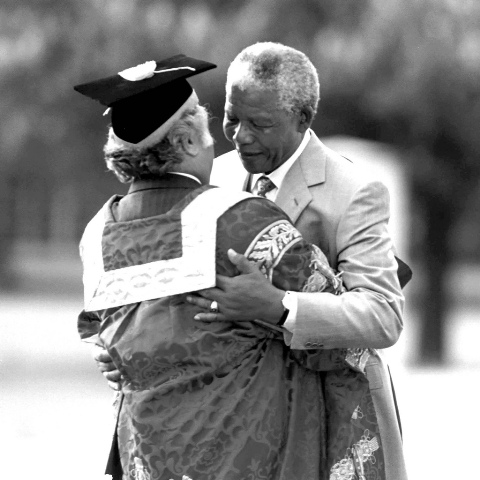 Nelson Mandela greeting Sir Shridath Ramphal, Chancellor Emeritus of the UWI, during a 1996 visit to the UK. [Photo: Sir Shridath Ramphal and the University of the West Indies]
Nelson Mandela greeting Sir Shridath Ramphal, Chancellor Emeritus of the UWI, during a 1996 visit to the UK. [Photo: Sir Shridath Ramphal and the University of the West Indies]
The Editor of The Round Table has invited my opinion ‘on the subject of the unfortunate controversy that Queen Elizabeth has been finding herself in recently, namely of racism’.
I am uninformed about all the circumstances of this recent matter and, therefore, refrain from offering any view on it. However, I have sufficient first-hand experience of Her Majesty The Queen, in relation to the Commonwealth’s legendary struggle against racism, to state categorically that, as Head of the Commonwealth, from the moment of her inheritance of that role, non-racialism has been her credo. And, she demonstrated it in word and deed.
The 54 racially diverse states in voluntary association in the Commonwealth embrace Queen Elizabeth because of her known commitment to each of their countries and for the special respect she has shown for their cultures and religions, and her ease in the company of their people and leaders of all races.
My years as Commonwealth Secretary-General (1975–90) saw the Commonwealth tested acutely and directly on the racial front. The two significant cases were Southern Rhodesia (now Zimbabwe) and South Africa. Southern Rhodesia was controlled by a white minority that had disenfranchised its black majority. The task was to ensure that it was not granted independence from Britain before majority African rule. In South Africa, the odious system of apartheid persisted and the leaders of the African majority, notably Nelson Mandela, were in prison. The majority of Commonwealth countries and their leaders were determined that this wrong should not prevail.
In the Commonwealth’s contribution to the resolution of these two profoundly racial issues, The Queen was both an ally and an advocate, even to the point of declining to accept the advice of her British Prime Minister, Margaret Thatcher.
In August 1979, she went to Zambia for a meeting of Commonwealth Heads of Government despite Thatcher’s advice not to do so. It was that conference that gave impetus to Southern Rhodesia’s independence as Zimbabwe under a system of one-person-one-vote. Later in 1985, when Thatcher was firmly against my preference for sanctions on the apartheid regime in South Africa, so steadfast was the Queen to the antiapartheid cause – the most acute global struggle against racism on black-white lines – that, once again, she stood firm against the position of Thatcher.
The Commonwealth could have been lost, had it divided along lines of race and colour. Prominent in holding it together was its non-racial ethos – whose custodian was the Commonwealth’s Head, The Queen.
Nelson Mandela always referred to The Queen as ‘‘my dear friend Elizabeth”. Their regard for each other transcended race and colour. It was based on mutual respect and admiration.
My own relationship with the Queen was, as far as I am concerned, no different.
Shridath Ramphal is a former Secretary-General of the Commonwealth.
Related item:
Round Table video and text series: The Commonwealth through the eyes of its former secretaries-general – Shridath Ramphal



